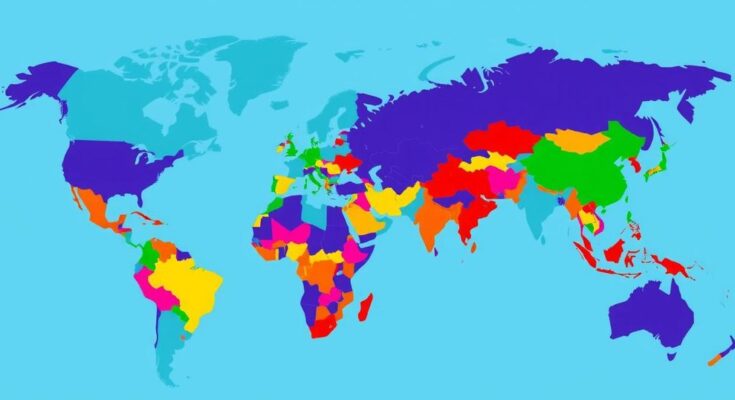The U.S. Department of State has upgraded travel advisories for numerous countries to Level 4 (Do Not Travel) due to rising risks related to crime, political instability, and terrorism. Countries affected include Afghanistan, Lebanon, and Venezuela, among others. Travelers are urged to stay informed and take necessary precautions as the spring break season approaches, signaling a significant shift in travel safety and perceptions.
The U.S. Department of State has recently updated its travel advisories, increasing warnings for numerous popular tourist destinations, particularly in Latin America and the Caribbean. Countries such as Russia, Jamaica, Colombia, Belarus, Yemen, Syria, and several others are now classified under Level 3 (Reconsider Travel) to Level 4 (Do Not Travel), due to escalating crime rates, political unrest, and terrorist threats. This shift signals a growing concern regarding the safety of American travelers at these locations, especially as the spring break season approaches.
Typically, these regions have drawn millions of American tourists for their cultural offerings and natural beauty. However, the fresh advisories underscore rising threats including armed robberies, kidnappings, and civil disorder in key tourist hotspots. The travel warnings urge U.S. citizens to exercise heightened vigilance while considering their travel plans.
The Level 4 travel advisory indicates severe security risks that warrant a complete travel ban for U.S. citizens. This advisory is deployed when U.S. authorities determine that potential threats from conflict, political instability, or other distressing conditions make travel unwise. The risks are reinforced by an increasing number of countries now subjected to such advisories, highlighting global security challenges for American tourists.
As 2025 unfolds, the advisories emphasize ongoing security dilemmas in various regions across the globe, including the Middle East, Africa, and Eastern Europe. The U.S. government implores prospective travelers to reassess their plans to visit areas marked by severe instability and conflict.
The U.S. travel advisory system categorizes travel hazards into four levels. A Level 4 advisory typically reflects a deterioration in safety, arising from prevalent violence and ineffective governance that jeopardizes both locals and foreign visitors.
Countries like Afghanistan remain perilous due to ongoing strife and the Taliban’s resurgence, cultivating an atmosphere rife with violent crime and terrorist acts. The U.S. Department of State categorically warns against travel to Afghanistan due to considerable risks, including limited healthcare access and rampant violence.
In the Democratic Republic of the Congo (DRC), widespread violence from militant groups poses a significant danger to travelers. Episodes of kidnapping and civil unrest, combined with a fragile healthcare system, create a precarious environment that warrants a strong discouragement from travel to the DRC.
Lebanon’s political instability and economic breakdown further exacerbate safety issues for travelers. High tensions and the risk of conflict, combined with the threat of terrorist attacks especially near Syria’s border, necessitate a Level 4 advisory against all travel to Lebanon.
The Central African Republic (CAR) faces grave dangers from ongoing clashes between government forces and armed groups. The violence and lack of law enforcement compel the U.S. government to advocate against all travel to CAR.
Belarus is marked by political repression and civil unrest, presenting risks of harassment and detention for American travelers amidst worsening ties with the U.S. Travel to Iraq is similarly discouraged due to the ongoing presence of ISIS and other armed groups, which continue to threaten security, particularly beyond Baghdad.
The war in Ukraine has also precipitated a Level 4 advisory due to active combat zones and concerns for civilian safety. American citizens face risks of capture and violence, leading to urgent guidance against travel to Ukraine until conditions improve.
Venezuela’s dire political and economic turmoil culminates in human rights violations and widespread crime, necessitating U.S. warnings against travel due to extreme security risks. Haiti’s persistent unrest and rampant gang violence fail to provide safe conditions for travelers, making travel inadvisable.
Iran’s precarious political landscape and the associated risks of detention for foreigners invoke a consistent Level 4 advisory from the U.S. authorities, urging a complete avoidance of travel.
Overall, countries under Level 4 advisories share common issues of ongoing conflict and instability. This environment poses significant risks to travelers, leading to the U.S. government implementing broad travel warnings. Despite these risks, some travelers may opt to visit these destinations, often unaware of the dire situation.
Travelers considering such high-risk destinations must adhere to strict safety measures. Recommended precautions include consulting the U.S. State Department’s travel advisory resources, participating in the Smart Traveler Enrollment Program (STEP), securing comprehensive travel insurance, and maintaining communication with local embassies. Ultimately, thorough risk assessment is critical for ensuring personal safety while traveling.
The rise in the number of Level 4 advisories will have profound repercussions for the travel industry. Airlines, travel agencies, and tour operators must continuously monitor security situations to ensure traveler safety and may need to adjust services and offerings accordingly. Increased demand for travel insurance that covers emergencies is expected as travelers become more cautious about their safety and well-being.
As the spring break season arrives, American travelers must remain vigilant regarding the escalating safety risks linked to Level 3 and Level 4 travel advisories for popular destinations. These advisories underscore the need for informed travel decisions amid increasing global unrest. The travel industry is poised to adapt in response to these safety concerns, emphasizing the necessity for travelers to stay informed, plan diligently, and prioritize safety to secure an enjoyable travel experience.
Original Source: www.travelandtourworld.com




